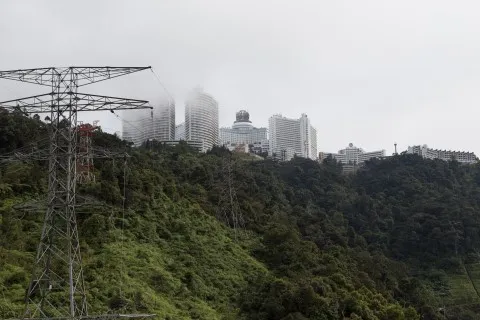
How will Chinese power players be affected by the sector reform document
Are margin pressures creeping in?
It has been noted that recently, www.ne21.com disclosed the official document “Opinions on Further Deepening the Power Industry Reform” (the Opinions), published by the General Office of the CPC Central Committee on 16 March.
According to a research note from Nomura, the Opinions set the general principles of the power sector reform in the coming years with the main intention/direction to increase marketisation in the industry.
On the development, Nomura commented that for IPPs, there will be margin pressure near term, but slightly positive long term on valuation re-rating opportunity.
Meanwhile, for wind farm operators, it will be at most neutral with uncertainties on tariff.
Here's more from Nomura:
Main spirit within expectation, with more detailed measures Compared to the previously released content of the power sector reform in October 2014, we do not see any significant changes, instead the Opinions provide more detailed measures to implement the power sector reform. However, given the Opinions were issued by the CPC Central Committee instead of the State Council, we see that the importance of the reform has been raised to a higher level.
Since the Shenzhen pilot programme launched effective 1 January 2015, we believe the central government is expediting the reform progress and targeting to have more regions to start the pilot programmes.
IPPs: Lower tariff for higher utilisation; expect margin pressure near term, but increasing earnings visibility long term For China IPPs, we see a mixed impact amid the implementation of the power sector reform, including: Positives: 1) Consistent with our previous view, with a market-oriented and transparent mechanism to determine the power tariff, the IPPs can generally pass through any cost fluctuation to the tariff, resulting in a more stable margin.
2) The power bidding mechanism should benefit the power generation companies with higher operating efficiency and lower generation costs (ie, our covered IPPs), which allows them to secure more generation quota, resulting in higher utilisation. 3) The deregulation of the power market also offers IPPs the opportunity to expand their business along the value chain, such as retail power trading business, etc.
Negatives: 1) Given the current loose power demand/supply situation, we believe the introduction of a power bidding mechanism (ie, to introduce more competition) will exert pressure on IPP margins, especially if the IPPs plan to raise their utilisation at the expense of margins.
2) In relation to the direct power supply, we believe the increase in utilisation will be insufficient to compensate the lower power tariff. As a reference, we expect Datang’s (991 HK, Buy) average tariff for the electricity sold under the direct-power supply contract to be CNY100/MWh (~25%) lower than the benchmark tariff.
At most neutral to the renewable energy plays Pursuant to the Opinions, we expect renewable energy (wind, solar, etc) to be exempted from the power bidding mechanism and continue to receive full purchase. The Opinions also re-emphasise the government’s direction to largely promote renewable energies, such as by providing support for grid connection, etc.
Overall, this should benefit the wind/solar farm operators by lowering the curtailment issue and in turn increasing utilisation. That said, we still see some uncertainties on the feed-in-tariff (FiT). As mentioned above, we expect the original benchmark price (ie, coal-fired on-grid tariff) to be lowered.
As such, it is still uncertain upon the implementation of the power bidding mechanism, whether renewable energy can maintain the current FiT, or maintain the same current renewable energy surcharge but with a lower benchmark price.
Potential tariff hike for hydropower Hydropower generation, given its lower generation cost but also lower tariff than coal-fired power generation, should benefit from the implementation of the power bidding mechanism, which would enable higher dispatch volume and a higher power tariff (as the power bidding mechanism disregards the fuel sources and allows “same grid, same price”). This should benefit CPID (2380 HK, Buy) with more hydropower exposure than other covered IPPs.
Any impact / benefits of power sector reform will only materialise in long term Overall, the Opinions have not specified any timeline for implementation and/or completion. In addition, given that 1) the power industry has a significant impact on the entire society and 2) the grid companies have strong bargaining power, we believe the power sector reform may take a long time to be fully implemented in China, probably 5-7 years (for gas price reform, despite of the lower impact to society than power, it also required 3-4 years to roll out nationwide). As such, any impact / benefits of the reform will likely only materialise in the long term.













 Advertise
Advertise











